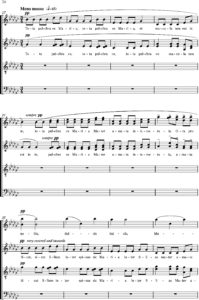A Conversation with John August Pamintuan
Cara Tasher
choral conductor and teacher
Cara Tasher (CT) Your music is very frequently performed, often in festivals and competitions by some of the top choirs in the world. Do you have some pieces also for intermediate level ensembles that would be a good entry point for conductors who may not be familiar with your music?
John August Pamintuan (JP) Yes, I also have pieces that are not too difficult, which are included in my catalogue from the last three years. I started writing for Filipino choirs (which generally have a wide vocal range) and usually a soprano from our country would find it easier to sing in the higher tessitura. Unfortunately, not all singers can do that, so conductors from other countries request me to transpose my pieces some steps lower, or in the case of new commissions, limit the vocal range of the singers, particularly the sopranos. For example: http://goo.gl/QX9dP . I believe this piece – Dulcis Maria – cannot do without the high b” flat in pianissimo because that is where the music is going, so it is potentially difficult for other choirs, but the Filipina sopranos can sing this with ease. When I compose music, I make sure that I myself can sing all the parts, to make sure it is humanly possible, and that I can ask anyone to sing it.
(Click on the image to download the full score)
CT Can you give me some hallmarks of your compositional style?
JP From a philosophic point of view, I would say analysis-synthesis. I break down the constituents of a motif or theme then reconstitute them into a new whole in keeping with the parameters requested by the person or group that commissioned the music. Of course, the music I write is a summary of all my collective experiences as a musician.
CT What are your influences?
JP Beautiful melodies and beautiful poetry.
CT Do you have any favorite composers?
JP In a slumbook that would be too many to mention, or in a microscopic field, too numerous to count. However, among my contemporaries, I like the music of Erik Esenvalds, from Latvia. I believe we have a totally different writing style, and that listening to his music gives me relief.
CT What is your favorite magical musical moment memory?
JP I usually rehearse a choir and focus mostly on the technical aspects: the vocal technique, the pitch and tempo, and during an actual performance. I limit my hand gestures, and just conduct with my eyes, and smile, and let the music flow from the singers’ hearts. The result is always magical.
CT You are skilled in so many areas, why are you drawn to composing?
JP One day in 2008, a close friend advised me to stop working – teaching in a school or choir – and just focus on composing, an aspect of my life which steadily flourished even without nurture and care. I have been composing full time since then, and now I cannot think of a better occupation where one can keep one’s own time, pace, and life.
CT Do you feel an overarching responsibility for the future of choral music when you are composing?
JP Actually, yes. I always think I have to write something innovative, trend-setting; a piece of music that will last a few lifetimes; something that reflects the past, is of the moment, and will be of the future.
CT Where do you get your best musical ideas?
JP I believe there is ‘someone’ higher than all of us who writes the music. We are just the messengers, so I just open my mind like a faucet and like water the music comes out. The musical ideas will stop flowing when I write the double bar line.
CT How many commissions do you take a year? What is your ideal commission situation?
JP Last year, I wrote about 80 pieces. Ideally, I would like at least two weeks to finish a piece, but usually I submit it within four days. It takes one hour for me to finish the music, three hours to encode on software, and three days to review and criticize the final work. The piece I wrote today is for a small ensemble in Singapore composed of 20 female (SSA), and three male singers (baritone). On the one hand, I have to write within the ranges, capability, and number of the singers, which may limit my imagination. On the other hand, the piece has to turn out fantastic so that other groups in the future would like to perform it too.
CT You must be aware that many young people admire you. What advice do you give to aspiring young composers?
JP My advice to younger composers is to write music for no reason. Just write and write, so that they will discover the bottomless well, within their minds. Also to share your music, because it is a gift, one that is meant to be shared.
CT What does the global choral community not know about you that you would like to share?
JP The quality of music that I write depends totally on the food I eat while writing. Sometimes I write in a fast-food restaurant; sometimes I need to eat in two or more restaurants when I am writing an arrangement for a medley. And, incidentally, it is my 10th year as a composer this year, so I would like to thank you for giving me this opportunity to celebrate with you.
 John August Pamintuan is a winner of composition prizes from Tours, France 2009 and Tokyo, Japan 2008. Recognized by the American Federation of Musicians as an artist of sustained international acclaim, John has written around 300 commissioned works which are widely performed in international competitions. His works are published by Astrum in Europe, and Pana Musica in Japan. John is a member of the World Choir Council along with other choral experts from 80 different countries. This year he is guest conductor and jury member at the Takarazuka International Chamber Choir Competition in Japan, Jeunesses Musicales Festival in Split, Croatia, the Rimini International Choral Competition in Italy, and the World Choir Games in Cincinnati, USA. He is also a sole featured artist at Japan Choral Directors Association in Tokyo 2012, and in South Africa, Indonesia and Croatia in 2013. More information can be found at www.johnpamintuan.com
John August Pamintuan is a winner of composition prizes from Tours, France 2009 and Tokyo, Japan 2008. Recognized by the American Federation of Musicians as an artist of sustained international acclaim, John has written around 300 commissioned works which are widely performed in international competitions. His works are published by Astrum in Europe, and Pana Musica in Japan. John is a member of the World Choir Council along with other choral experts from 80 different countries. This year he is guest conductor and jury member at the Takarazuka International Chamber Choir Competition in Japan, Jeunesses Musicales Festival in Split, Croatia, the Rimini International Choral Competition in Italy, and the World Choir Games in Cincinnati, USA. He is also a sole featured artist at Japan Choral Directors Association in Tokyo 2012, and in South Africa, Indonesia and Croatia in 2013. More information can be found at www.johnpamintuan.com

